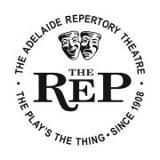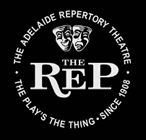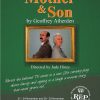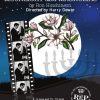| Review by Stephen Davenport |
| Adelaide Rep’s version of the Pulitzer Prize-winning play Cat on a Hot Tin Roof is a delight. Director Barry Hill has delivered up a gratifyingly insinuating and refined production of the Tennessee Williams classic with, at its hub, two truly exceptional performances from Anita Pipprell (Maggie “the Cat”) and from Russell Starke (Big Daddy). Hill’s set, moreover, admirably brings a fifties Mississippi plantation – sun-touched walls, chaise lounge, hints of opulence, and touches of period – to a cold, bleak and wet Adelaide. In addition, Aubade’s costumes including silk night attire and safari suits add much to the tone and feel of being in Dixie. Brick (Joshua Coldwell), an alcoholic ex-pro football player, has broken his leg and is dependent on a crutch. He drinks and broods his days away and resist the affection of his wife, Maggie. Together, they’re visiting his family’s estate, in order to celebrate Big Daddy’s 65th birthday. Bricks reunion with his father who is dying of cancer, brings to the fore a multitude of reminiscences and disclosures for both of them. Meanwhile, Big Mama (Jude Brennan) is fussing and flustered, while Maggie is certain that Brick’s brother Gooper (Alan Fitzpatrick) and his wife Mae (Nicole Rutty) are trying to get Brick disinherited. The tale of sex, lies and death can easily be dragged down by the despondent anti-hero Brick, or the bombastic Big Daddy, but Hill controls the situation and constructively allows the Cat to have a huge presence throughout. Pipprell superbly takes advantage, and captivates the audience from the start and never lets go. So much so, that her authority is even felt in scene in which doesn’t even appear. It’s a charmingly nuanced execution, with genuine profundity, that magnificently captures “Maggie the Cat’s” dissatisfaction, misfortune, hunger, acrimony, anguish and humour – often with a mere glance or a finely delivered judgment. The entire ensemble is capable, but it’s Pipprell and Starke – his brusque portrayal restrains the melodrama and prevents his character from becoming a caricature – who both mange to make this multifaceted play, and its often convoluted discourse, teem with life. Joshua Coldwell, also deserves plaudits, for playing the dejected and drunken Brick, with a subdued subtly, that allows the other actors to bounce off him with vivacious animation. Overall, this fine production is funny, poignant, and thought-provoking, and the director et al delivers a beautifully told story that adds another entertaining chapter in this plays history. |
Review by Peter Bleby
| The Elephant Man is a courageous choice for an amateur theatre company, with its multiple scenes and complex messages, and it takes a director of the experience and skill of Megan Dansie and the cast that she is able to recruit to pull it off. Not a stage version of the film: it was more the other way around in fact. It is very much a theatre piece which not only chronicles a true tale of a couple of extraordinary 19th century Englishmen and their effect on each other, but also throws up unmistakeably the fact that as a society we have not moved a long way in our acceptance of difference. Joseph (John) Merrick was an exceptionally ugly man grappling with serious deformities from his childhood up. As a consequence he suffered crippling discrimination and derision until rescued at some level by an exceptionally talented, generous and scientifically curious surgeon who took care of Merrick in his hospital for the last four years of this unfortunate man’s life. Robert Bell as Merrick and Steve Marvanek as his rescuer/ benefactor, Doctor (later Sir) Frederick Treves excel equally in this production. It is no mean feat to maintain a crumpled and angular pose for two hours, but Bell wears this with convincing understanding and consistency. Meanwhile the fact that the author calls for no prosthetics to accentuate the deformities, emphasises the humanity and internal normalcy of this outwardly distorted figure. It is the disdain and disrespect of the society that generates any distortion of his psyche or inner being. Marvanek reliably shows the charity tempered with conservatism and self interest of Treves, with his axiom that self help is the best help, and his aim to get Merrick as “normal as possible, while he benefits from the good repute and revenue generated by his harbouring of this deformed but appealing novelty. Furthermore, the question arises, as to whether even Merrick himself is being encouraged to exploit his new friends as he offers them the same “service” as he offered to the lower classes when he was trucked around as an object of their scorn and amusement in the circus. A supporting cast, several with multiple roles, fill out the story as it becomes a challenging metaphor for our own society’s degradation of the different, and not dealing with the challenge of seeing the essential humanity which is the core of every individual. Authentic period costumes (Jean Walker and Bev George), and an uncluttered set by Robert Webb, augmented with black and white projections on the back wall, with targeted lighting by Richard Parkhill allows the portrayal of a range of locations from a Brussels fairground to a railway station, to the London Hospital where Merrick lived his last four years, and died. Altogether a fine production of an important story, with a great cast, which is a credit to all involved, and which should be seen by large audiences. Adelaide Repertory Theatre presents THE ELEPHANT MAN by Bernard Pomerance Director Megan Dansie |






